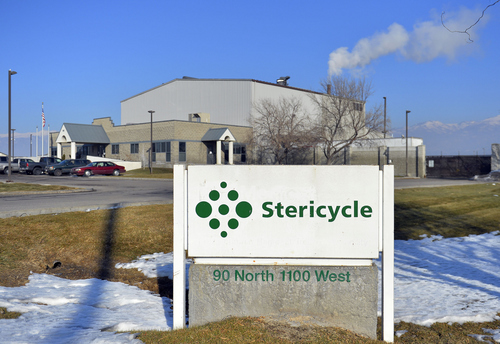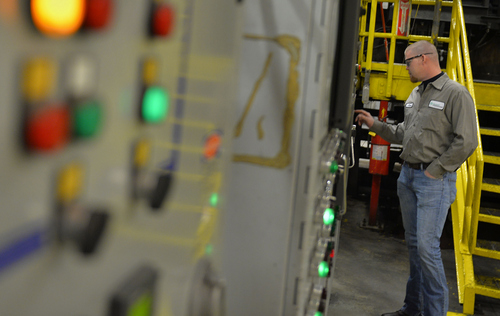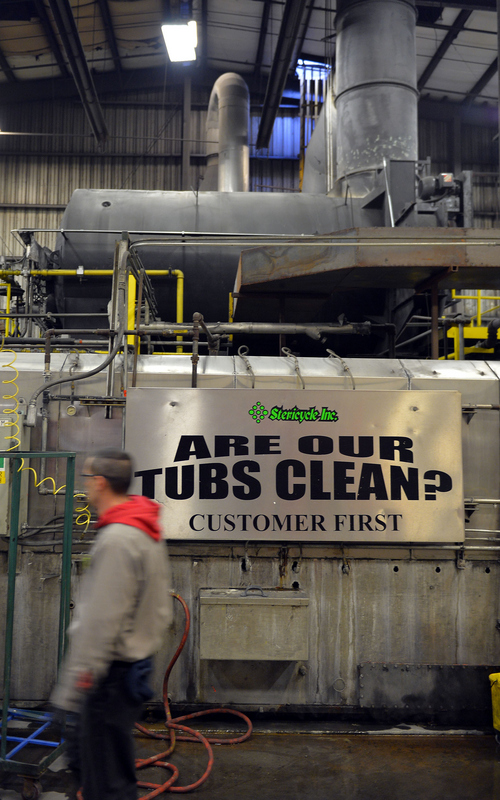This is an archived article that was published on sltrib.com in 2014, and information in the article may be outdated. It is provided only for personal research purposes and may not be reprinted.
Medical-waste handler Stericycle hopes to alleviate controversy surrounding its North Salt Lake incinerator by moving it 30 or so miles west to an uninhabited stretch of Tooele County. Instead, activists are ramping up pressure on Gov. Gary Herbert to shut down the company's Utah operations and calling on him to scuttle a land deal his own staff helped broker.
Critics accuse the governor of "rewarding" a company caught violating its permit by negotiating a "backroom deal" to find a new home on state land. The proposed site is near Rowley, just east of the Wasatch Regional Landfill between the Lakeside Mountains and Stansbury Bay at the southwest corner of the Great Salt Lake.
The Utah School and Institutional Trust Lands Administration has agreed to sell Stericycle the land, contingent upon a slew of approvals needed to obtain a permit for an incinerator. The agency is insisting Stericycle acquire at least 40 acres, a much larger parcel than its current site, so there will be a buffer surrounding the plant.
But activists, who claim incineration of medical waste is not necessary, say they want the company out of Utah.
"They cheated the books and are under investigation criminally. Why we do we trust this company? Why are we bending over for them? It says a lot about the governor," said Alicia Connell, a founder of Communities for Clean Air and former Stericycle neighbor.
Connell was referring to state and federal enquiries into Stericycle's operations. In May, the state Division of Air Quality issued a notice of violation alleging Stericycle's toxic emissions exceeded limits set in its permit and that the company manipulated stack test results.
Stericycle is formally contesting the allegations, which could result in a fine and other sanctions.
Meanwhile, company officials say the incinerator's emissions are far below limits specified in its permit, which expires next month. As part of its permit renewal, they propose spending $1.5 million to replace its back-up generator and emission control equipment.
Selin Hoboy, Stericycle's vice president of legislative and regulatory affairs, said she is "dumbfounded" by the activists' renewed opposition, noting that company is legally able to stay put in the Foxboro neighborhood.
"I don't think we can do anything to make them happy," Hoboy said. "We thought this would be a positive change for us to take the step to move incineration operations to an area that's more conducive."
Stericycle limits incineration to non-hazardous pharmaceuticals, trace chemotherapy and pathological waste, or body parts and tissues, according to Hoboy. Other forms of waste are shipped out of state to autoclaves, a steam-based technology that is not effective for rendering drugs safe, she said.
But Connell contends the proposed incineration site is just upwind of Salt Lake's airshed, whose load of particulate pollution violates federal standards.
"By moving them to Tooele, I hope they don't think it's out of sight, out of mind. We don't want to make our problem into someone else's," she said. "It's still our problem."
Utah law requires both the Legislature and the governor to sign off on the siting of any new solid-waste disposal facility, so Herbert remains in a position to kill the deal. Stericycle must also secure an new operating permit under Title V of the Clean Air Act, expected to be a multiyear process.
Communities for Clean Air and other Utah environmental health advocacy groups plan to protest at the Capitol outside the governor's office in the next two weeks.
"We want the governor to talk to us. We want him to recognize this is a big issue," Connell said.
Air-quality town hall Wednesday
The Tribune's Jennifer Napier-Pearce will moderate a town-hall discussion on Utah's air quality challenges with a panel of experts at 7 p.m. on Wednesday, Jan. 29, at the Salt Lake City Main Library, 210 E. 400 South.
The discussion will be broadcast live on KCPW 88.3/105.3 FM and at sltrib.com. You can submit questions in advance by sending an email to utairquality@sltrib.com.







